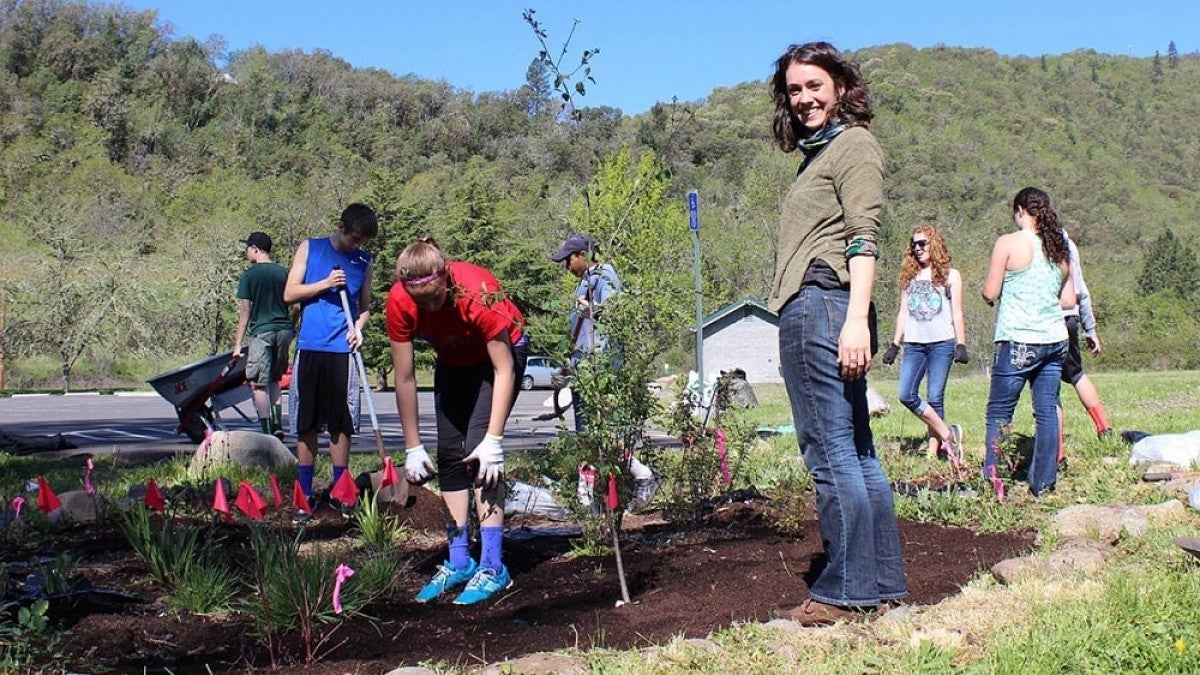In Oakridge, residents often have to live with poor air quality from wood-burning stoves and the city’s valley location where stagnant and toxic air can settle. But a University of Oregon program is working to improve this environmental challenge.
Reducing pollution in Oakridge through energy efficient upgrades, weatherization projects and distribution of air purifiers is one of dozens of projects happening in rural communities around the state through Resource Assistance for Rural Environments, more commonly known as RARE, an AmeriCorps program housed at the UO. The Oakridge project is one of thousands undertaken since the program launched 28 years ago.
RARE’s mission is to increase the capacity of rural communities to improve their economic, social and environmental conditions. It does that by placing members in rural cities and towns to work on projects like downtown development, renewable energy upgrades, land use and natural resource planning, community food assessments, and economic recovery from COVID-19 and wildfires.
The program has placed more than 600 members in rural communities around Oregon since it was established in 1994. It is administered through the UO’s Institute for Policy Research and Engagement, where it is able to leverage the expertise of the institute’s researchers in issues like planning, public policy, housing and transportation.
The program places young professionals in rural communities, where they spend 11 months contributing the skills, expertise and resources of the UO, as well as their own energy and excitement for the work.
“RARE helps these communities meet their most pressing needs by pairing them with recent graduates who are passionate about these issues,” said Titus Tomlinson, the RARE program director, who served two consecutive terms in the program himself and describes it as a life-changing experience.
“And the program is helping to build up the next generation of leaders who will continue to make a difference in communities,” he said.
One of the exciting features of the program is that it provides a mutually beneficial experience to both the communities and the program’s members, Tomlinson said. The individuals who participate in RARE are able to build professional skills, technical knowledge and project management experience through their immersive work helping communities.
Johnathan Van Roekel opted into a second year of service with RARE, partially because he felt he was getting such valuable professional and life experience from his placement.
The recent college graduate is serving with the Lake County Resources Initiative, where he helps small businesses and agricultural producers get funding for renewable energy systems, including solar, wind and hydro projects. The program was just awarded a $100,000 grant from the U.S. Department of Agriculture to support its work helping rural communities transition to renewable energy infrastructure that provides both environmental benefits and lowers energy costs for consumers.
Through his service and his work helping several small business owners and farmers access more affordable and more efficient energy, Van Roekel has recognized his strengths and explored the contributions he can make through his work.
“My experience in RARE has empowered me to ask, ‘What are the problems I can help solve, both in this program and beyond?’” Van Roekel said. “We’re given a lot of independence and hands-on experience through RARE, which allows us to see where our work is really making a difference.”
Grace Kaplowitz also opted into a second year with the program because she was getting so much out of the experience. Kaplowitz is working with the city of Oakridge, and the air quality improvement project is one of her top priorities.
But it’s far from her only project. She is also helping the city with economic development, business recruitment, wildfire resilience, tourism and outdoor recreation initiatives, affordable housing improvements, and building up the local workforce.
Kaplowitz grew up in a small town outside Oakridge, and she appreciates that RARE gives her the opportunity to work and serve in rural Oregon, and that it’s given her really big projects to work on with enough support to succeed. Through all of the projects, she’s learning a lot about collaboration, relationship building, facilitation and project management, she said, and she appreciates that RARE connects its members with communities that have so many needs and can really benefit from the time and energy of RARE members.
“It’s a great opportunity to work in rural Oregon, where I can feel really connected to the work and really connected to the community while also exploring my own professional interests and strengths,” she said.
—By Emily Halnon, University Communications


